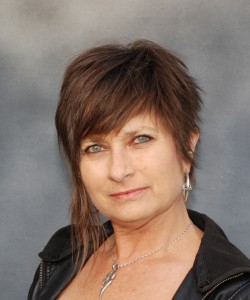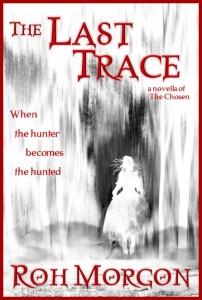Women in Horror: Part Seventeen
Today we’re joined by author Roh Morgon on what horror means to her…
It’s an honor to have been selected to participate in the HWA’s recognition of Women in Horror Month.
Examining the accomplishments of women in this genre has forced me to look closer at my own work and determine whether or not it actually belongs in the horror category.
Before discussing the contributions of women writers to the horror genre, we should first conduct a brief examination of the genre itself.
Horror.
The word conjures images of screaming women, dripping blades, and evil phantasms stalking the innocent.
At least for me.
What about you? What do you think of when you encounter that word?
Do you think of movies like The Shining or Alien, or slashers like the Saw and Nightmare on Elm Street series, or the more current Paranormal Activity films?
Or do you think of books by authors like H.P. Lovecraft or Shirley Jackson, King or Barker, whose stories you were afraid to put down because it meant turning off the lights and releasing unspeakable horrors to slither out from beneath the bed?
Horror can mean many things.
What I write is not hard core horror. Evil phantasms, deranged serial killers, monstrous alien creatures, and other icons of the genre don’t slither across my pages. Rather, the stalkers I pen belong in the supernatural category that springs from ancient myths—vampires, werewolves, shapeshifters, and the occasional disembodied demon.
Since these entities have traditionally belonged to the horror genre, I’ve felt more at home among their writers than among those of fantasy or romance.
Romance, you might say? Yeah. I confess. Some of my characters do find their way into romantic entanglements, but unless you like your nights on the town splashed with blood and littered with bodies, these are not dates either you or I would care to go on. And happily ever after? Forget it. Not happening. When you watch your lover toss a corpse across the room like it’s a football, you can’t help but worry that you might be next.
Paranormal romance and urban fantasy, considered by some to be subgenres of horror, have brought great success to many women writers. Though my work contains elements of each, it doesn’t entirely fit within either one.
In attempting to find a home for me and my stories, I’ve tried to define what horror means.
Merriam-Webster and Oxford dictionaries offer several definitions:
- horror: a very strong feeling of fear, dread, shock, disgust, or dismay
You will experience little fear, dread, or even disgust from reading my work, though non-horror readers do sometimes have issues with the images I paint of torn throats and coursing blood.
But shock and dismay? Yes. Regret? Plenty. And the constriction in your chest working its way up your throat? The prickling skin electrifying your scalp and that sudden intake of breath? Those sensations you might experience with my characters as they face appalling choices and devastating losses—provided I’ve done my job as a writer.
In my opinion, horror offers the one of the best avenues in literature for the exploration of what makes us human by examining what makes us not.
So it seems natural to me that many of the finest examiners are women. By focusing less on the physical events and more on the reactions of their characters to them, women’s stories dig deep into our psyches to expose the raw emotions governing our existence at the most primal levels.
I’ve never really thought about author gender before when diving into a book. My only awareness is whether or not the characters grab me by the throat and drag me kicking and screaming with them on their journeys—or better yet, apply a strong lash to my backside as I race toward the next chapter.
But Women in Horror Month made me start thinking about the stories that I love, that I can’t forget, and who wrote them.
Which is its main purpose—to recognize the achievements and contributions of women in the genre, to raise them from the obscurity to which history so habitually has relegated them in all their endeavors.
When I look at the horror writers who’ve wielded the strongest influence on my own storytelling, I’m not surprised to discover the majority of them are women.
In the 1990s, a movie hit the theaters that changed my perception of the horror genre. And when I read the book, Anne Rice’s Interview with the Vampire, it opened my eyes to a side of horror which fascinated rather than terrified me. Always an avid reader, I quickly embraced its more subtle assault on my senses.
I wasn’t the only one affected by Rice’s work. The vampire genre exploded in that decade, and there was no shortage of titles on bookstore and library shelves. Modern twists and viewpoints freshened the legend, bringing endless variety to what had been a stagnant theme.
Though I enjoyed works like Kim Newman’s Anno Dracula and George R. R. Martin’s Fevre Dream, it was the vampire fiction written by women that impressed me the most. Several left their mark upon me, and their books still cling to my walls.
Nancy A. Collin’s Sonja Blue series, beginning with Sunglasses After Dark, features a female vampire—the first I encountered—as she kicks ass on a continual barrage of supernatural bad guys.
In Nancy Baker’s Kiss of the Vampire (aka The Night Inside), a young woman kidnapped as fodder for an imprisoned vampire negotiates a risky bargain with him in order for them both to escape.
Chelsea Quinn Yarbro’s Saint-Germain collection focuses less on the blood-drinking and more on the immortality of her vampire as he moves through time in a series which could easily double as historical fantasy.
My favorite is Elaine Bergstrom’s Austra series. Starting with Shattered Glass, the stories follow an extended family of vampires whose unique traits set them apart from any others I’ve come across.
A discussion of 1990s vampire fiction wouldn’t be complete without mentioning Poppy Z. Brite, Laurel K. Hamilton, and Tanya Huff, writers whose careers were just beginning to get off the ground at that time.
More recently, I discovered several other women writers whose stories have etched themselves into my brain.
The first is Octavia Butler, known more for her edgy science fiction and fantasy. Her 2005 story Fledgling, about a child vampire, delivers a brilliant twist to the legend.
The other is Suzy McKee Charnas and her 1980 Nebula-winning novella, The Unicorn Tapestry (from The Vampire Tapestry). Her character Weyland haunted me for weeks after reading it.
That is something I hope to be able to do someday—to write like these women, to create worlds and immortalize characters in the minds of readers, and to leave them stunned and craving for more.
And maybe, just maybe, a bit horrified. Just a little.
Roh Morgon’s favorite stories center on the horror of the beast within. She’s best known for her vampire series which begins with Watcher: Book I of The Chosen and includes the historical horror The Last Trace, along with the 2013 novella “The Games Monsters Play” from High Stakes: A Vampire Anthology. Her next novel, Runner: Book II of The Chosen, is scheduled for release later this year. Roh can be found online at www.rohmorgon.com and www.facebook.com/rohmorgon.
Below is an excerpt from the opening of her novel, Watcher: Book I of The Chosen.
I watch my daughter, the sunlight dancing across her long dark hair, cradle her swollen belly as she kneels to place the flowers on my empty grave. Pink carnations this time … last year was red roses; the year before, golden mums.
Her shoulders quake with her sobs and, swallowing, I fight to stifle my own. Her lips move as she whispers to the flower-strewn ground, but I’m too far away to hear her precious words. Throat tight, I struggle to remain still, hidden by the large eucalyptus at the other end of the cemetery.
She caresses my name etched into the grey granite, tracing the letters one by one before wiping the tears from her cheeks. Her fingers touch her lips, then the top of the cold hard stone.
My own fingers clamp against my mouth and smother the impulse to cry out to her.
She looks so much like me—the me I used to be. Tall, willowy, she’s become a woman since I disappeared five years ago and soon, to my surprise, will become a mother. The inferno of emotions ignited by her pregnancy threatens to devour me and I do not think I can remain quiet much longer. For once, I hope she will end her visit soon and leave.
She stands and turns toward her car. A breath of summer wind lifts a few dark strands of her hair and they float for a moment, waving in the breeze.
Her scent reaches out to me and triggers memories of our brief life together. Seventeen years was not enough—not enough time to share with her, to hold her and teach her and tell her how much I love her. In a flash of anger I curse the evil creature that stole me away, leaving my daughter to finish growing up alone, and leaving me … leaving me no longer human.
My chest heaving, I watch her drive away, then step between the markers and cross the lawn to my grave. Once again, I read the inscription on my headstone:
Sunshine Collins
Beloved Mother and Best Friend
October 10, 1969 –
Trembling, I rest my fingers where hers last touched, press them softly against my lips, and whisper, “I love you, Andrea.”
In appreciation for the HWA supporting Women in Horror month, Roh is offering free digital editions of Watcher: Book I of The Chosen to HWA members. Please email her at roh.morgon@gmail.com to request a copy in either .pdf, .mobi, or .epub format.






